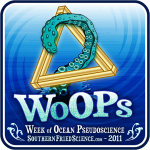 Over the last couple of years of doing social science research at a marine laboratory, I’ve heard any number of comments about the social sciences that are rooted in a fundamental misunderstanding of the culture of a different (and relatively new) discipline. In a broader context, the Social Science, Behavior, and Economics (SBE) directorate of NSF was recently under fire and threatened to be cut entirely from NSF for ‘not being a science’. Under the umbrella of Ocean of Pseudoscience Week, I’m going to tackle some of those myths.
Over the last couple of years of doing social science research at a marine laboratory, I’ve heard any number of comments about the social sciences that are rooted in a fundamental misunderstanding of the culture of a different (and relatively new) discipline. In a broader context, the Social Science, Behavior, and Economics (SBE) directorate of NSF was recently under fire and threatened to be cut entirely from NSF for ‘not being a science’. Under the umbrella of Ocean of Pseudoscience Week, I’m going to tackle some of those myths.
10. Social scientists hide the fact that they have nothing to say in impenetrable jargon.
Admittedly, many social science journals are filled with jargon and complicated theory that are impenetrable by anyone outside the discipline. Part of this is due to the fact that most social sciences are still in the young, growing stages – and this means theory-building. We’re creating new words to describe never-before-described phenomena and deciding which of those terms will work for future discussion on the matter. Many pages of our journals are therefore filled with dense social theory terms as people make tiny contributions to big understanding of the way society functions. On the flipside, there are a few journals and other outlets (such as blogs like this one) for a translated version, lots of times for policymakers, that offer easy-to-understand conclusions and empirical examples.
Furthermore, to defend our use of unfamiliar vocabulary, I’d like to point out that I never heard of the discipline ‘geography’ until I arrived in graduate school, even though that’s a field with which I largely identify today. It’s due to my particular educational history, but I’m sure I’m not alone, as geography is disappearing in secondary and higher education. In fact, up until college with its distinct disciplines physically separated on campus, “social studies” – the one class – is meant to cover all the social sciences, history, and many others in one fell swoop. I’d argue that the reason people find social scientists full of jargon is that they haven’t received the basic education they deserve that helps them understand the lingo of other disciplines.